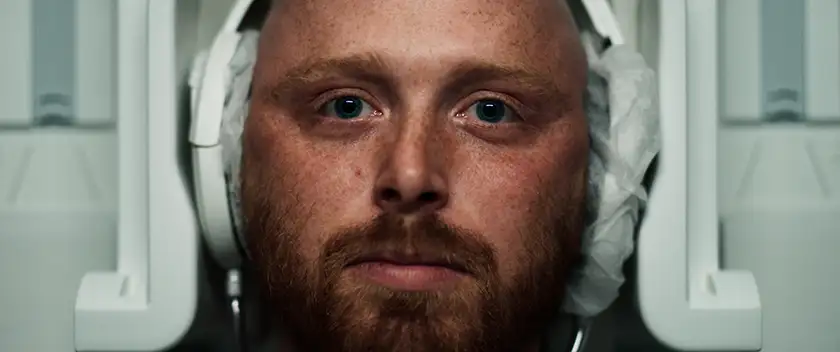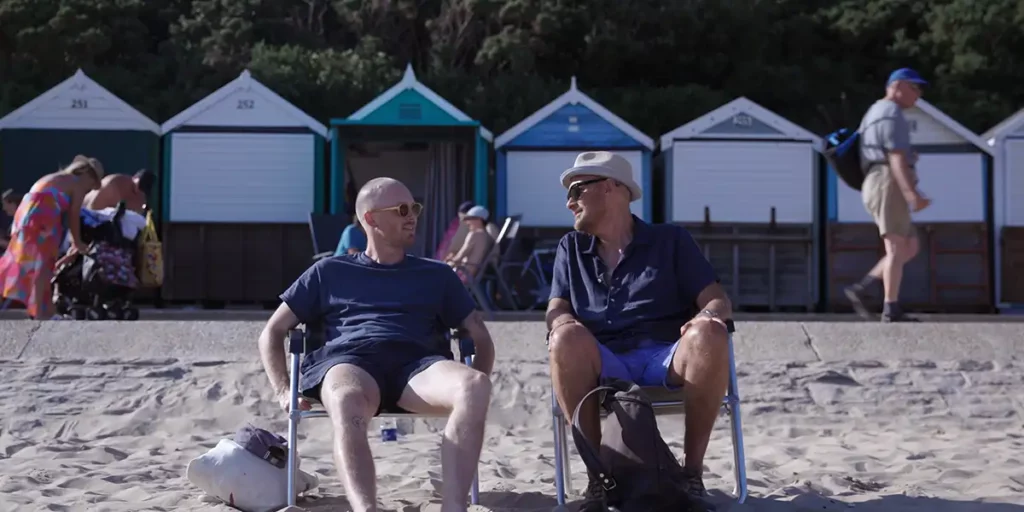In the touching Red Herring, young filmmaker Kit Vincent explores the impact of his terminal brain tumour diagnosis on those around him.
Director: Kit Vincent
Genre: Documentary
Run Time: 97′
UK Release: May 3, 2024
US Release: TBA
Where to watch: in cinemas & VOD
In the age of the smartphone, social media and the selfie, it seems inconceivable that our faces and voices won’t endure long after we have shuffled off this mortal coil. If the current state of the average person’s camera roll is anything to go by, a child born today will feature in thousands of photos and videos before they even reach adulthood.
And yet, the award-winning director Kit Vincent is still preoccupied with gifting his loved ones ‘something to remember me by’ after he passes away from the tumour in his brain. Red Herring is that something, and what a gift it is.
At the heart of Red Herring is not so much Kit’s illness and its physical effect on him, as the psychological impact on his family, most notably his father, Lawrence. We learn early on that on hearing his son’s diagnosis, Lawrence collapsed, his heart literally stopping for 30 seconds, while Kit simply wanted to pick up his camera and start filming. This sets the tone for the rest of the film, as it did their lives; Lawrence grappling with his son’s mortality and Kit obsessed with his own filmic legacy. We also meet Kit’s partner and mother, who, like Lawrence, deal with the situation in ways that clash with his own approach; while they cope, he films.
Lacking much of a structure but for a few climactic moments, the film is essentially a series of intimate dialogues. Kit and his family discuss his condition, the future, his family history and difficult relationship with his mother, the kind of stuff one would want to explore when faced with impending death. As he continually insists, though, Kit is more interested in his father’s transformation since the diagnosis than his own. Lawrence has started painting, writing poetry, birdwatching, and exploring the Jewish faith, his son’s sickness rendering the hardy man a more pensive, philosophical creature. The pair’s exchanges are playfully confrontational, Kit interrogating his dad and Lawrence often biting back with straight-talking northern wit. When Lawrence struggles, Kit often responds with humour and sarcasm, a recognisable dynamic that really strikes a chord.
The film’s most interesting moments are those that don’t shed the filmmaker in the most flattering light. In one scene, Kit and his partner Isobel are considering the possibility of preserving his sperm cells should his next round of treatment render him infertile, when Isobel implores him to stop filming. ‘You didn’t want to talk with me about this stuff when you didn’t have the camera,’ she laments, and one can sense what a gut-punch this is to the director’s ego. It’s not the first time this has been brought up: Lawrence frequently tries to turn the camera back on his son, eventually succeeding, and paving the way for Kit to consider why he’s given himself and his family the additional burden of filmmaking during the most difficult time of their lives. It’s when things don’t play out how the artist had intended that Red Herring really shines, its filmmaker unafraid of exposing his own fallibilities even now.

As a film whose emphasis is firmly on dialogue, Red Herring is no cinematographic masterpiece, but there are moments of visual beauty. Kit is determined to create an optimistic work, one that is full of life, and his directorial style reflects this. Much of the footage is shot by Kit himself, a wobbly handheld style complementing the home videos from his childhood scattered throughout the documentary. In a particularly moving scene, his mother tears up as she describes the idea of her own son dying before her, while in the background her chickens cluck away and the leaves of her garden bristle in a summery breeze. There are certainly moments of morbidity – Kit alone in clinical settings, shot by a still and distant camera – but for the most part the film’s visual language is one of warmth and vivacity, as if all it wants to say is ‘life goes on’.
Red Herring doesn’t offer answers to the big questions its subjects are facing, nor do we learn anything novel about cancer and its effect on the body or mind. But it does its job, serving as a testament to its director’s life, and to the visual culture that has defined it. Kit Vincent’s documentary encourages us to consider why we film ourselves and others, what we create when we tap that red button, and what it can take away from us, too. It’s a fine work by a gifted young filmmaker, and a true labour of love.
Red Herring will be released in select UK cinemas and on demand on May 3, 2024.
Loud and Clear Reviews has an affiliate partnership with Apple, so we receive a share of the revenue from your purchase or streaming of the films when you click on the button on this page. This won’t affect how much you pay for them and helps us keep the site free for everyone.

